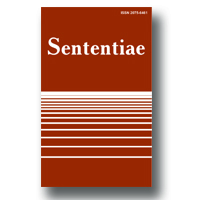|
1.
|
Sententiae:
Volume >
40 >
Issue: 2
Сергій Секундант
Sergii Secundan
Вольф і еклектицизм: від поняття відкритої системи до систематичного інтелекту
Wolf and Eclecticism: From the Concept of an Open System to Systematic Intelligence
abstract |
view |
rights & permissions
| cited by
The paper provides a comparative analysis of the programs of reforms of philosophy developed by Christian Wolff and the members of the Eclecticist school. It reveals the critical foundations of the concepts of the system by both schools and assesses the prospects of their further development. Although Wolff is often inconsistent, he is nevertheless closer to Descartes and Leibniz, and therefore to the Platonic tradition. The Eclecticists, on the other hand, are closer to the Peripatetic tradition, and therefore to empiricism. From the point of view of the history of philosophical methodology, Wolff’s program combines Cartesianism and the German tradition of methodical thinking (J. Jung, E. Weigel and Leibniz), which both were oriented towards mathematics. The Eclecticists, on the other hand, used the dialectical model, which they modernized by introducing the principle of historicism and applying it to the history of philosophy. When the program of the Eclecticists was guided by the critical selection of knowledge by members of the "scientific community" and the concept of an open system, Wolff’s synthesis of knowledge is carried out on the basis of a rigorous method. He puts forward a fundamentally new idea of a universal system based on new normative requirements for the system-forming principle - it must be fundamental, generally valid and immanent in the system of knowledge. Wolff does not reject the critical program of the Eclecticists; he tries to prove that the successful implementation of their program is possible only if there is a basic system of truths and a reliable method. In his treatise On the Difference Between Systematic and Non-systematic Intellect, Wolff laid the foundation of “systematic eclecticism” and “speculative criticism”, which was substantiated in the works by "classics of German idealism", primarily by C. L. Reinhold and Hegel.
The paper provides a comparative analysis of the programs of reforms of philosophy developed by Christian Wolff and the members of the Eclecticist school. It reveals the critical foundations of the concepts of the system by both schools and assesses the prospects of their further development. Although Wolff is often inconsistent, he is nevertheless closer to Descartes and Leibniz, and therefore to the Platonic tradition. The Eclecticists, on the other hand, are closer to the Peripatetic tradition, and therefore to empiricism. From the point of view of the history of philosophical methodology, Wolff’s program combines Cartesianism and the German tradition of methodical thinking (J. Jung, E. Weigel and Leibniz), which both were oriented towards mathematics. The Eclecticists, on the other hand, used the dialectical model, which they modernized by introducing the principle of historicism and applying it to the history of philosophy. When the program of the Eclecticists was guided by the critical selection of knowledge by members of the "scientific community" and the concept of an open system, Wolff’s synthesis of knowledge is carried out on the basis of a rigorous method. He puts forward a fundamentally new idea of a universal system based on new normative requirements for the system-forming principle - it must be fundamental, generally valid and immanent in the system of knowledge. Wolff does not reject the critical program of the Eclecticists; he tries to prove that the successful implementation of their program is possible only if there is a basic system of truths and a reliable method. In his treatise On the Difference Between Systematic and Non-systematic Intellect, Wolff laid the foundation of “systematic eclecticism” and “speculative criticism”, which was substantiated in the works by "classics of German idealism", primarily by C. L. Reinhold and Hegel.
|
|
